11 start with J start with J
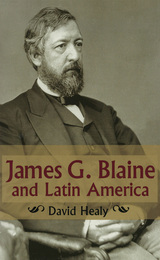
James G. Blaine was one of the leading national political figures of his day, and probably the most controversial. Intensely partisan, the dominant leader of the Republican Party, and a major shaper of national politics for more than a decade, Blaine is remembered chiefly for his role as architect of the post-Civil War GOP and his two periods as secretary of state. He also was the Republican presidential candidate in the notorious mud-slinging campaign of 1884. His foreign policy was marked by its activism, its focus on Latin America, and its attempt to increase U.S. influence there.
James G. Blaine and Latin America asserts that Latin America lay at the heart of Blaine's foreign policy and his vision for America. David Healy examines seven major issues that collectively defined the secretary of state's methods, goals, and views regarding Latin America and, more broadly, the international role of the United States. Healy places his explorations within the larger context of Blaine's ongoing role as a national party leader, his relations with the presidents under whom he served, and the responses of his predecessors and successors toward the issues at hand in Latin America.
The result is a deeper understanding of Blaine's ambitious vision for his country's international role, his energy and aggressiveness in moving to achieve that vision, and his effective efforts to transmit his worldview to the public. Blaine's emphasis on the importance of Latin America to the United States and his conviction that his country should be a world power influenced a new generation of leaders who, at the end of the century, would go beyond his goals and usher in a new era.
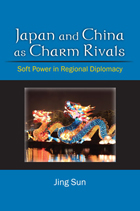
In international relations today, influence is as essential as military and economic might. Consequently, leaders promote favorable images of the state in order to attract allies and win support for their policies. Jing Sun, an expert on international relations and a former journalist, refers to such soft power campaigns as "charm offensives."
Sun focuses on the competition between China and Japan for the allegiance of South Korea, Taiwan, and other states in the region. He finds that, instead of adopting a one-size-fits-all approach, the Chinese and the Japanese deploy customized charm campaigns for each target state, taking into consideration the target's culture, international position, and political values. He then evaluates the effectiveness of individual campaigns from the perspective of the target state, on the basis of public opinion polls, media coverage, and the response from state leaders.
A deep, comparative study, Japan and China as Charm Rivals enriches our understanding of soft power by revealing deliberate image campaign efforts and offering a method for assessing the effectiveness of such charm offensives.
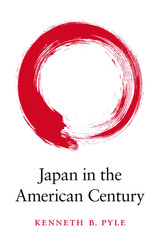
No nation was more deeply affected by America’s rise to world power than Japan. President Franklin Roosevelt’s uncompromising policy of unconditional surrender led to the catastrophic finale of the Asia-Pacific War and the most intrusive international reconstruction of another nation in modern history. Japan in the American Century examines how Japan, with its deeply conservative heritage, responded to the imposition of a new liberal order.
The price Japan paid to end the occupation was a cold war alliance with the United States that ensured America’s dominance in the region. Still traumatized by its wartime experience, Japan developed a grand strategy of dependence on U.S. security guarantees so that the nation could concentrate on economic growth. Yet from the start, despite American expectations, Japan reworked the American reforms to fit its own circumstances and cultural preferences, fashioning distinctively Japanese variations on capitalism, democracy, and social institutions.
Today, with the postwar world order in retreat, Japan is undergoing a sea change in its foreign policy, returning to an activist, independent role in global politics not seen since 1945. Distilling a lifetime of work on Japan and the United States, Kenneth Pyle offers a thoughtful history of the two nations’ relationship at a time when the character of that alliance is changing. Japan has begun to pull free from the constraints established after World War II, with repercussions for its relations with the United States and its role in Asian geopolitics.
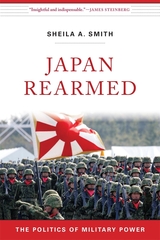
Japan’s U.S.–imposed postwar constitution renounced the use of offensive military force, but, as Sheila Smith shows, a nuclear North Korea and an increasingly assertive China have the Japanese rethinking that commitment, and their reliance on United States security.
Japan has one of Asia’s most technologically advanced militaries and yet struggles to use its hard power as an instrument of national policy. The horrors of World War II continue to haunt policymakers in Tokyo, while China and South Korea remain wary of any military ambitions Japan may entertain. Yet a fundamental shift in East Asian geopolitics has forced Japan to rethink the commitment to pacifism it made during the U.S. occupation. It has increasingly flexed its muscles—deploying troops under UN auspices, participating in coercive sanctions, augmenting surveillance capabilities, and raising defense budgets.
Article Nine of Japan’s constitution, drafted by U.S. authorities in 1946, claims that the Japanese people “forever renounce the use of force as a means of settling international disputes.” When Prime Minister Shinzo Abe broke this taboo by advocating revision of Article Nine, public outcry was surprisingly muted. The military, once feared as a security liability, now appears to be an indispensable asset, called upon with increasing frequency and given a seat at the policymaking table.
In Japan Rearmed Sheila Smith argues that Japan is not only responding to increasing threats from North Korean missiles and Chinese maritime activities but also reevaluating its dependence on the United States. No longer convinced that they can rely on Americans to defend Japan, Tokyo’s political leaders are now confronting the possibility that they may need to prepare the nation’s military for war.
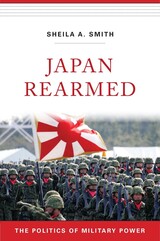
“Washington’s relationship with Tokyo is generally considered the most important of the United States’ 70-odd alliances. In this intimately knowledgeable book, Smith shows how that alliance looks to the Japanese: increasingly unreliable.”—Andrew J. Nathan, Foreign Affairs
“Masterfully traces the interplay of Japan’s military heritage, politics, national sentiment, threats, and alliance with the United States in the formation and development of the Self-Defense Force. Even experts will find new information and insights.”—Admiral Dennis Blair, US Navy (Ret.), former Commander-in-Chief, US Pacific Command
“A must-read for US policymakers responsible for Asia.” —J. Thomas Schieffer, former US Ambassador to Japan
“A highly readable and richly detailed account of Japan’s rearmament and the politics surrounding it.”—Journal of American–East Asian Relations
Japan has one of Asia’s most technologically advanced militaries, yet it has struggled to use its hard power as an instrument of national policy. The horrors of World War II continue to haunt policymakers in Tokyo, but a fundamental shift in East Asian geopolitics has forced Japan to rethink its commitment to pacifism. Its military, once feared as a security liability, now appears to be an indispensable asset.
In Japan Rearmed, Sheila Smith argues that Japan is not only responding to threats from North Korean missiles and Chinese maritime activities, it is fundamentally reevaluating its dependence on the United States as its leaders confront the very real possibility that they may soon need to prepare for war.
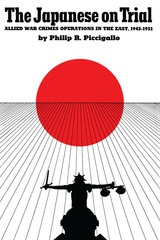
This comprehensive treatment of post–World War II Allied war crimes trials in the Far East is a significant contribution to a neglected subject. While the Nuremberg and, to a lesser degree, Tokyo tribunals have received considerable attention, this is the first full-length assessment of the entire Far East operation, which involved some 5,700 accused and 2,200 trials.
After discussing the Tokyo trial, Piccigallo systematically examines the operations of each Allied nation, documenting procedure and machinery as well as the details of actual trials (including hitherto unpublished photographs) and ending with a statistical summary of cases.
This study allows a completely new assessment of the Far East proceedings: with a few exceptions, the trials were carefully and fairly conducted, the efforts of defense counsel and the elaborate review procedures being especially noteworthy. Piccigallo’s approach to this emotion-filled subject is straightforward and evenhanded throughout. He concludes with a discussion of the broader implications of such war crimes trials, a matter of interest to the general reader as well as to specialists in history, law, and international affairs.
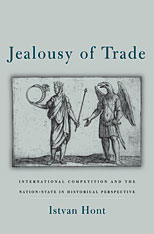
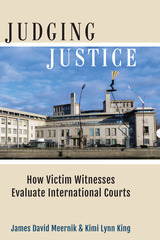
In order to understand the meaning of justice, James David Meernik and Kimi Lynn King studied the perspective of witnesses who have testified before the International Criminal Tribunal for the Former Yugoslavia (ICTY). Using a unique survey, Meernik and King look at the identity of the victims and their perception of the fairness of ICTY. Because of the need to justify the practical and emotional difficulties involved in testifying before an international tribunal, witnesses look not just to the institution to judge its effectiveness, but also to their own contribution, by testifying effectively. The central elements of the theory Meernik and King develop—identity, fairness, and experience—transcend specific conflicts and specific countries and are of importance to people everywhere.

What obligations do nations have to protect citizens of other nations? As responsibility to our fellow human beings and to the stability of civilization over many years has ripened fully into a concept of a "just war," it follows naturally that the time has come to fill in the outlines of the realities and boundaries of what constitutes "just" humanitarian intervention.
Even before the world changed radically on September 11, policymakers, scholars, and activists were engaging in debates on this nettlesome issue—following that date, sovereignty, human rights, and intervention took on fine new distinctions, and questions arose: Should sovereignty prevent outside agents from interfering in the affairs of a state? What moral weight should we give to sovereignty and national borders? Do humanitarian "emergencies" justify the use of military force? Can the military be used for actions other than waging war? Can "national interest" justify intervention? Should we kill in order to save?
These are profound and troubling questions, and questions that the distinguished contributors of Just Intervention probe in all their complicated dimensions. Sohail Hashmi analyzes how Islamic tradition and Islamic states understand humanitarian intervention; Thomas Weiss strongly advocates the use of military force for humanitarian purposes in Yugoslavia; Martin Cook, Richard Caplan, and Julie Mertus query the use of force in Kosovo; Michael Barnett, drawing on his experience in the United Nations while it debated how best to respond to Rwandan genocide, discusses how international organizations may become hamstrung in the ability to use force due to bureaucratic inertia; and Anthony Lang ably envelopes these—and other complex issues—with a deft hand and contextual insight.
Highlighting some of the most significant issues in regard to humanitarian intervention, Just Intervention braves the treacherous moral landscape that now faces an increasingly unstable world. These contributions will help us make our way.
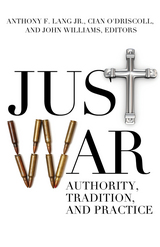
The just war tradition is central to the practice of international relations, in questions of war, peace, and the conduct of war in the contemporary world, but surprisingly few scholars have questioned the authority of the tradition as a source of moral guidance for modern statecraft. Just War: Authority, Tradition, and Practice brings together many of the most important contemporary writers on just war to consider questions of authority surrounding the just war tradition.
Authority is critical in two key senses. First, it is central to framing the ethical debate about the justice or injustice of war, raising questions about the universality of just war and the tradition’s relationship to religion, law, and democracy. Second, who has the legitimate authority to make just-war claims and declare and prosecute war? Such authority has traditionally been located in the sovereign state, but non-state and supra-state claims to legitimate authority have become increasingly important over the last twenty years as the just war tradition has been used to think about multilateral military operations, terrorism, guerrilla warfare, and sub-state violence. The chapters in this collection, organized around these two dimensions, offer a compelling reassessment of the authority issue’s centrality in how we can, do, and ought to think about war in contemporary global politics.
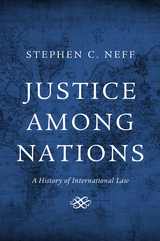
Justice among Nations tells the story of the rise of international law and how it has been formulated, debated, contested, and put into practice from ancient times to the present. Stephen Neff avoids technical jargon as he surveys doctrines from natural law to feminism, and practices from the Warring States of China to the international criminal courts of today.
Ancient China produced the first rudimentary set of doctrines. But the cornerstone of later international law was laid by the Romans, in the form of natural law—a universal law that was superior to early laws and governments. As medieval European states came into contact with non-Christian peoples, from East Asia to the New World, practical solutions had to be devised to the many legal quandaries that arose. In the wake of these experiences, international legal doctrine began to assume its modern form in the seventeenth and eighteenth centuries.
New challenges in the nineteenth century encompassed the advance of nationalism, the rise of free trade and European imperialism, the formation of international organizations, and the arbitration of disputes. Innovative doctrines included liberalism, the nationality school, and solidarism. The twentieth century witnessed the formation of the League of Nations and a World Court, but also the rise of socialist and fascist states and the advent of the Cold War. Yet the collapse of the Soviet Union brought little respite. As Neff makes clear, further threats to the rule of law today come from environmental pressures, genocide, and terrorism.
READERS
Browse our collection.
PUBLISHERS
See BiblioVault's publisher services.
STUDENT SERVICES
Files for college accessibility offices.
UChicago Accessibility Resources
home | accessibility | search | about | contact us
BiblioVault ® 2001 - 2024
The University of Chicago Press









